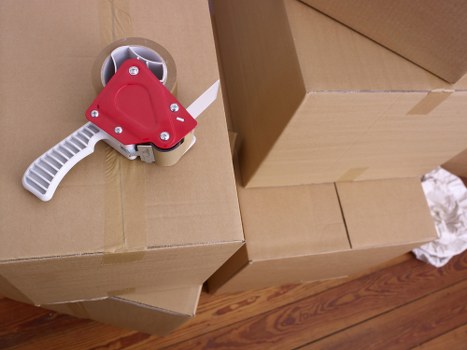Commercial Moves in Belgium Removal
Understanding Commercial Removals

Commercial moves are intricate processes that require meticulous planning and execution. Unlike residential moves, commercial relocations often involve transporting specialized equipment, sensitive documents, and valuable assets. The success of a commercial move hinges on the expertise of the removal company handling the logistics.
In Belgium, the demand for professional commercial removal services has surged, driven by the country's dynamic business landscape. Companies expanding, downsizing, or relocating their offices rely on specialized removal firms to ensure a seamless transition.
Choosing the right removal partner can significantly impact the efficiency and cost-effectiveness of the move. It's essential to understand the nuances of commercial relocations to make informed decisions.
Preparing for Your Move

Proper preparation is the cornerstone of a successful commercial move. Begin by conducting a comprehensive inventory of all items to be moved. This includes office furniture, electronic equipment, documents, and other assets. Categorizing items based on their size, value, and sensitivity can aid in planning the logistics of the move.
Establishing a clear timeline is equally crucial. Coordinate with your removal company to determine the optimal dates for packing, transportation, and unpacking. This coordination helps minimize disruptions to your business operations.
Informing employees about the move and providing them with clear instructions can also facilitate a smooth transition. Effective communication ensures that everyone is on the same page and can adapt to the changes seamlessly.
Choosing the Right Removal Company

Selecting a reputable removal company is paramount for a successful commercial move. Look for firms with extensive experience in handling commercial relocations. Experienced companies are better equipped to manage the complexities and unique challenges that come with moving a business.
Verify the company's credentials, including licenses and insurance. Insurance coverage protects your assets during transit, providing peace of mind. Additionally, seek companies that offer customized moving solutions tailored to your specific needs.
Reading reviews and seeking recommendations can also help you gauge the reliability and quality of the removal services. A company with a proven track record is more likely to deliver satisfactory results.
Cost of Commercial Moving

The cost of a commercial move in Belgium can vary based on several factors, including the size of the move, distance, and specific services required. It's essential to obtain detailed quotes from multiple removal companies to compare pricing structures and services offered.
Some companies charge based on the volume of items, while others may use a flat-rate pricing model. Understanding the pricing mechanism helps you budget effectively and avoid unexpected expenses.
Additionally, consider any additional costs such as packing materials, insurance, and storage fees. Being aware of all potential expenses ensures a comprehensive approach to budgeting for your move.
The Moving Process

The actual moving process encompasses several stages, each requiring careful attention to detail. Packing is one of the most time-consuming tasks, especially when dealing with delicate and valuable items. Professional removal services often provide specialized packing materials and techniques to safeguard your assets.
Transportation logistics play a critical role in the efficiency of the move. Coordinating the timing of pick-up and delivery, ensuring the right vehicles are used, and navigating Belgium's roads can influence the overall success of the relocation.
Upon arrival at the new location, the unpacking and setup phase begins. Proper placement of furniture, installation of electronic equipment, and setting up workspaces are essential for resuming business operations promptly.
Minimizing Downtime
One of the primary concerns during a commercial move is minimizing downtime. Prolonged business interruptions can lead to loss of revenue and decreased productivity. Implementing a well-structured moving plan helps ensure that the transition is swift and efficient.
Staggering the move by working in phases can allow parts of the business to remain operational during the relocation. This strategy helps maintain continuity and reduces the impact on daily operations.
Employing efficient communication strategies and utilizing project management tools can also aid in keeping the move on track and within the desired timeframe.
Handling Sensitive Equipment
Businesses often rely on specialized equipment that requires careful handling during a move. From IT servers to medical devices, ensuring the safety and functionality of sensitive equipment is crucial.
Professional removal companies are trained in handling delicate electronics and have the necessary equipment to protect and transport such items securely. They understand the specific requirements for different types of equipment, including climate control and shock resistance.
Conducting thorough testing of equipment after the move helps identify any issues that may have arisen during transportation, allowing for prompt resolution without significant downtime.
Legal and Regulatory Considerations
Relocating a business in Belgium involves adhering to various legal and regulatory requirements. This includes updating business addresses with government bodies, ensuring compliance with local zoning laws, and securing necessary permits for the new location.
Failure to comply with these regulations can result in fines and legal complications that can hinder the relocation process.
Consulting with legal advisors and ensuring that all paperwork is in order before the move can help navigate the legal complexities associated with commercial relocations.
Post-Move Follow-Up
After the move, conducting a thorough inspection of the new premises ensures that everything is in order. Checking for damages, verifying the placement of items, and testing equipment are essential steps to confirm that the move was successful.
Gathering feedback from employees about the moving process can provide valuable insights for future relocations. Addressing any concerns or issues promptly helps maintain a positive work environment post-move.
Planning a small office event or meeting in the new location can also help employees acclimate and foster a sense of community in the new space.
Choosing a Sustainable Moving Option
Sustainability is becoming increasingly important in business operations. When planning a commercial move in Belgium, consider eco-friendly moving practices. This includes using recyclable packing materials, optimizing transportation routes to reduce carbon emissions, and selecting removal companies committed to sustainable practices.
Implementing green moving strategies not only reduces the environmental impact but also enhances your company's reputation as a responsible and environmentally conscious entity.
Investing in sustainability during the move can also lead to long-term cost savings and operational efficiencies.
Conclusion

Embarking on a commercial move in Belgium is a significant endeavor that demands careful planning, execution, and collaboration with experienced professionals. By understanding the complexities involved and partnering with a reliable removal company, businesses can ensure a smooth transition to their new premises.
From minimizing downtime to handling sensitive equipment, each aspect of the move requires attention to detail and strategic planning. Emphasizing communication, sustainability, and post-move evaluations further enhances the success of the relocation.
Ready to make your commercial move effortless? Contact us today to schedule your professional removal services and ensure a seamless transition for your business.



